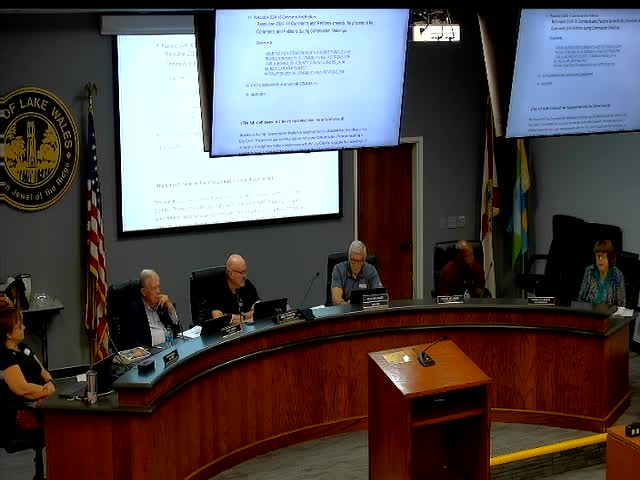Commissioner clashes over public comment restrictions
July 10, 2024 | City of Lake Wales, Polk County, Florida

This article was created by AI summarizing key points discussed. AI makes mistakes, so for full details and context, please refer to the video of the full meeting. Please report any errors so we can fix them. Report an error »

During a recent city commission meeting in Lake Wales, a heated debate emerged over proposed changes to public comment procedures. The discussion centered on the balance between allowing citizen input and ensuring that comments remain relevant to city business.
One commissioner expressed concern that the current format of public comments often devolves into unrelated topics, such as historical lectures and personal anecdotes, which detracts from addressing pressing city issues. They argued that the commission should prioritize hearing from constituents about matters directly affecting the community, suggesting that the first segment of public comments be limited to city-related topics. This change, they argued, would lead to more productive discussions and better decision-making.
In contrast, another commissioner vehemently opposed the proposed changes, asserting that they would limit citizens' rights to express their views. They emphasized the importance of open forums and argued that restricting comments to city business could disenfranchise residents who may have urgent concerns unrelated to the agenda. This commissioner highlighted that many cities maintain open public comment periods, and the proposed changes could set a concerning precedent for limiting public discourse.
The debate also touched on procedural aspects, with some commissioners suggesting that the time allocated for public comments could be adjusted to accommodate longer discussions when necessary. However, the core disagreement remained focused on the nature of the comments allowed at the beginning of meetings versus those permitted at the end.
As the commission prepares to vote on these procedural changes, the outcome could significantly impact how residents engage with their local government and the types of issues that are prioritized in public discussions. The meeting underscored the ongoing tension between maintaining order in city governance and ensuring that all voices are heard in the democratic process.
One commissioner expressed concern that the current format of public comments often devolves into unrelated topics, such as historical lectures and personal anecdotes, which detracts from addressing pressing city issues. They argued that the commission should prioritize hearing from constituents about matters directly affecting the community, suggesting that the first segment of public comments be limited to city-related topics. This change, they argued, would lead to more productive discussions and better decision-making.
In contrast, another commissioner vehemently opposed the proposed changes, asserting that they would limit citizens' rights to express their views. They emphasized the importance of open forums and argued that restricting comments to city business could disenfranchise residents who may have urgent concerns unrelated to the agenda. This commissioner highlighted that many cities maintain open public comment periods, and the proposed changes could set a concerning precedent for limiting public discourse.
The debate also touched on procedural aspects, with some commissioners suggesting that the time allocated for public comments could be adjusted to accommodate longer discussions when necessary. However, the core disagreement remained focused on the nature of the comments allowed at the beginning of meetings versus those permitted at the end.
As the commission prepares to vote on these procedural changes, the outcome could significantly impact how residents engage with their local government and the types of issues that are prioritized in public discussions. The meeting underscored the ongoing tension between maintaining order in city governance and ensuring that all voices are heard in the democratic process.
View full meeting
This article is based on a recent meeting—watch the full video and explore the complete transcript for deeper insights into the discussion.
View full meeting